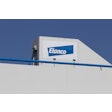Mammary cancer has been associated with numerous factors, including diet. Polyphenolic antioxidants found in pomegranate fruits have been shown to reduce tumor burden and inhibit angiogenesis and cell growth. Feline mammary carcinomas (FMC) are known to have similar invasive behavior, histologic appearance and overall poor prognosis to estrogen receptor negative (ER-) invasive human mammary cancer. In this study, supplementation with an antioxidant-rich whole food (pomegranate) was evaluated for anti-cancer properties in an ER- human breast cancer cell line (MDA-MB-231) as a model for FMC.
Antioxidant capacity and polyphenolic content of pomegranate juices (PJ) were characterized by reportable methods. ER- cells were exposed to PJ at various concentrations (0.5%, 1%, 5%) and to Cisplatin (5 ug/ml, 10 ug/ml, 15 ug/ml) doses for 48 and 72 hours. MTT assays were performed to evaluate the ability of PJ to inhibit tumor cell growth. Statistical significance was determined using PROC GLM (SAS 9.1) with alpha=0.05.
Cell proliferation of the ER- cancer cells was inhibited by pomegranate juice in a dose- and time-dependent manner (p<0.0001). Maximal inhibition was seen for pomegranate juice formulations at the 5% dose, and the response was comparable to that of high-dose Cisplatin. This first-phase study shows that PJ may be a useful nutrient-based, non-chemotherapeutic alternative for the inhibition of ER- breast cancer cell proliferation.
Source: A.E. Tanner et al., 2007. Proceedings of the AAVN 7 th Annual Clinical Nutrition and Research Symposium, Seattle, Washington, USA.











